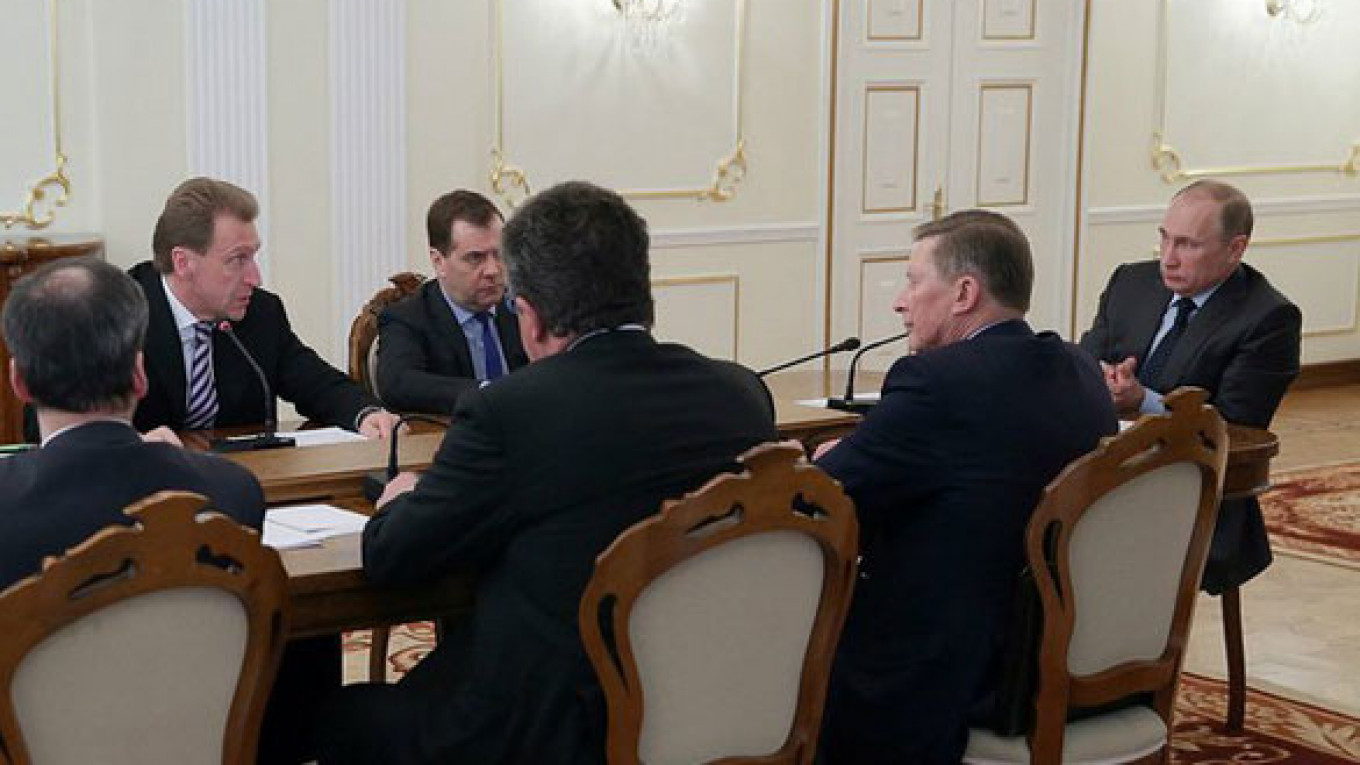President Vladimir Putin on Wednesday held another meeting with Cabinet ministers to discuss the faltering economy, the latest ritual that might further diminish Prime Minister Dmitry Medvedev's stature.
Putin started out by asking Economic Development Minister Alexei Ulyukayev to report on finding ways to give momentum to an economy whose growth slowed to 1.3 percent last year. Russia's traditional source of business activity — high crude prices, which have steadily held above $100 a barrel — did not help.
Seeking to spur progress on economic incentives and execution of his populist campaign promises, Putin started with a meeting on Jan. 15, and has since held them every two weeks. Wednesday's meeting was the third in the series that is thought to be a bad omen for Medvedev, who was in attendance.
"It shows a lack of satisfaction with the activity of the prime minister and represents an effort by Putin to intervene," said political analyst Dmitry Oreshkin. "It is an indirect sign that Medvedev is little by little heading for the sidelines of political life, and he does not have far to go."
Putin took a break from the Sochi spotlight to return to his his Novo-Ogaryovo residence outside Moscow on Wednesday and opened the meeting by saying that oil exports, a key source of revenue for state spending, have exhausted their potential to encourage economic growth. Then he asked Ulyukayev to give an account of measures that the government could introduce to improve the situation.
Putin also requested reports about what the government was doing to increase labor productivity in the country and help single-industry towns to reduce dependence on their sole major employers.
Putin then demanded to know more about the government's efforts to support exports by Russian companies, and streamlining the country's trade offices abroad.
Another issue on the agenda was the establishment of the state cadastral registry of real estate and completion of the evaluation of property held by individuals, so the government could apply taxes based on current market value.
There was no news from the meeting about Ulyukayev's report as of Wednesday evening.
Analyst Oreshkin reiterated the idea that Medvedev could become a scapegoat for the sluggish economy, and have to step down as prime minister — but could be awarded a consolation job outside the executive branch. Taking over the helm of the Supreme Court, which just merged with the Supreme Arbitration Court for business litigations, would be a suitable move, Oreshkin said.
Putin also asked First Deputy Prime Minister Igor Shuvalov to update him on the measures to reverse a decline in the number of registered individual entrepreneurs. More than a half million of the self-employed, such as taxi drivers and kiosk owners, deregistered last year after the government doubled their payroll tax burden. A new law in effect since January reinstated the lower tax, Shuvalov said.
At the previous meeting with Cabinet ministers, one of the key issues was mortgages, which are also the subject of campaign promises. Shuvalov said the country's banks issued more than 800,000 mortgage loans last year — very close to Putin's target of 815,000 loans per year.
But Putin also promised that the rate on mortgages would come at 2.2 percent above inflation, which would have been 9 percent last year. Shuvalov acknowledged that, in fact, the rate was not lower than 12.5 percent last year.
Tatiana Golikova, chief of the accounting chamber— the government's state spending watchdog — said at the meeting that a promise about the level of salaries in public schools and culture institutions was not kept, according to the latest data.
Correction: An earlier version of this article said the Russian economy expanded by 1.6 percent in 2013. According to the State Statistics Service, the economy grew by 1.3 percent last year.
Contact the author at [email protected]
A Message from The Moscow Times:
Dear readers,
We are facing unprecedented challenges. Russia's Prosecutor General's Office has designated The Moscow Times as an "undesirable" organization, criminalizing our work and putting our staff at risk of prosecution. This follows our earlier unjust labeling as a "foreign agent."
These actions are direct attempts to silence independent journalism in Russia. The authorities claim our work "discredits the decisions of the Russian leadership." We see things differently: we strive to provide accurate, unbiased reporting on Russia.
We, the journalists of The Moscow Times, refuse to be silenced. But to continue our work, we need your help.
Your support, no matter how small, makes a world of difference. If you can, please support us monthly starting from just $2. It's quick to set up, and every contribution makes a significant impact.
By supporting The Moscow Times, you're defending open, independent journalism in the face of repression. Thank you for standing with us.
Remind me later.






